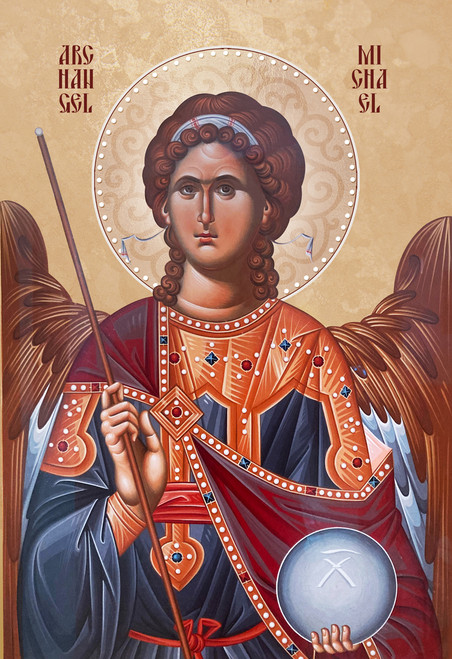Commemorated November 8
The name of the Archangel Uriel means the light or fire of God. Uriel is depicted with a sword raised upward and held in the right hand at the breast, and with fire in his left hand, turned downward. As the angel of light, Uriel primarily enlightens the minds of men with the revelation of truths in general and divine truths in particular. As the angel of divine fire, he enflames the hearts of those who appeal to him with love of God, and destroys within them all that is unclean, worldly, and sinful. For this reason he is regarded as the protector of all who work at spreading the true faith of Christ, i.e. missionaries, as well as people who have dedicated themselves to pure science. He is the true source of many great scientific discoveries. Those discoveries, of which the discoverers them-selves say that they often made them unexpectedly, by inspiration from above. Writers and poets should pray to Archangel Uriel to inspire them, if they wish to be writers and poets by the grace of God. But the archangel should not be asked to reveal the mysteries of nature, which surpass our mind and our human needs, or the prophecies of future events.
Let us hear how Uriel replied to Esdras, a righteous man, but one over-whelmed with excessive curiosity. Esdras wished to learn from the angel the secret of the fate planned for the earth by God, and the reason for the seeming victory of evil in the world. The archangel agreed to reply, but demanded that Esdras first fulfill one of the following three tasks: either weigh the flame of fire, or indicate the beginning of wind, or return the past day. When Esdras said that he was unable to do any of this, the wise archangel replied to him thusly:
“If I were to ask thee, how many dwellings there are in the midst of the sea, or how many springs in the beginning of the deep, or what boundaries hath paradise, thou wouldst perhaps say unto me: I never went down into the deep, nor as yet into hell, neither did I ever climb up into heaven. Nevertheless, now I have asked thee but only of the fire, and wind, and the day which thou hast passed through, that is, of things from which thou canst not be separated, and yet canst thou give me no answer of them.” And the angel said to Esdras: “Thine own things, and such as are grown up with thee, canst thou not know; how should thou then be able to comprehend the way of the Highest, and, the world being now outwardly corrupted, to understand the corruption that is evident in my sight?” (3 Esdras 4:7-11).
It would not be amiss for modern scientists to heed the archangel’s wise advice and to remember that men of knowledge should primarily be the servitors of the light of truth.







